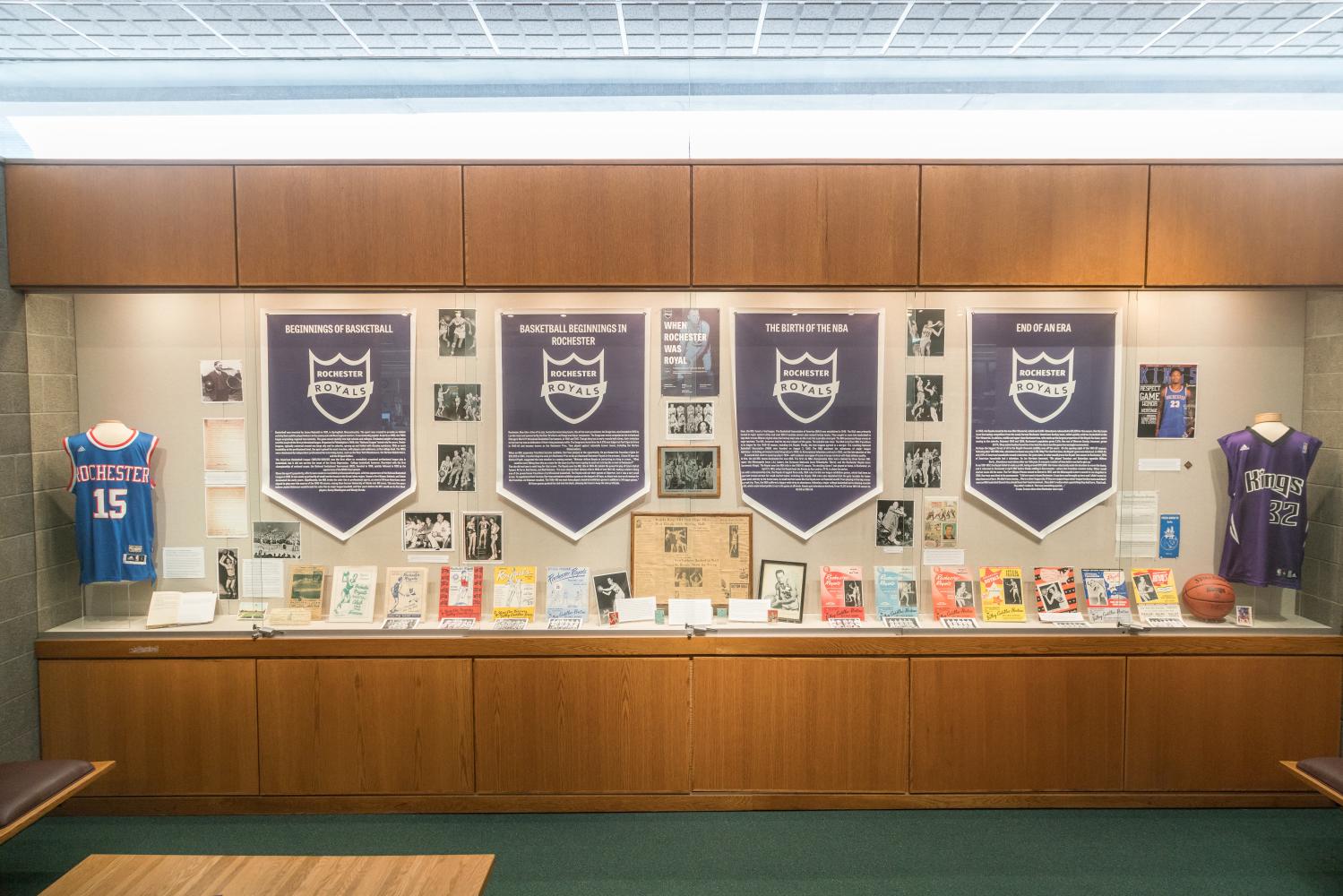1951: When the Royals Ruled Rochester
by Kristin Grant | published Apr. 26th, 2016
Rochester, 1951. A subway zips through downtown, Kodak’s industry is booming and The Royals have just brought home their first NBA championship. That’s right – Rochester once hosted its very own professional basketball team, back in the days when the NBA was just a fledgling league. Yet, despite the team’s success, a mere 5 years later the Royals were packing up and moving to Cincinnati. After a long and tumultuous history, the team once known as the Royals has morphed into today’s Sacramento Kings, its legacy in Rochester all but forgotten.
RIT History Department Chair Dr. Rebecca Edwards and her curation team members Michael Brown and Dr. Julie Decker could not let that happen. “We have this incredibly rich basketball history as one of the first NBA teams,” said Dr. Edwards. “Not only that, but the first integrated game in the NBA was played in Rochester – Earl Lloyd, for the Washington Capitols. A moment analogous with the story of Jackie Robinson. And yet no one knows it happened right here.”
So, in light of the 65th Anniversary of the Rochester Royal’s championship win, the curation team decided now was a perfect time to bring the team’s story out of obscurity. Over the past couple months, they have meticulously pulled together old memorabilia from a variety of sources to craft an impactful exhibition in the Wallace Library’s 2nd floor sunken gallery.
To further commemorate the anniversary, the History Department also hosted a panel discussion featuring David Dworkin, part-owner of the Sacramento Kings, Scott Pitoniak, co-host of “The Radio Press Box,” and Dr. Don Fisher, history professor at Niagara Community College. For over an hour, the panelists discussed the Royal’s story. Their tale started and ended with owner Lester Harrison, who led the Royals from a semi-professional team, to the NBL, the NBA and then eventually out of the city.
A Rochester native, Harrison “had an indescribable love the game,” said Dworkin, that drove him to create the best team he possibly could. Back in the team’s NBL days, Harrison was known for signing talent no matter what race. He was famous for giving African American player Dolly King substantial playing time while the rest of the league still prioritized its white athletes. Harrison also guided his team through the tumultuous transition from the NBL to the NBA, and was one of the strongest advocates for introducing the shot clock – a move that “saved basketball,” said Dworkin.
Yet despite all of Harrison’s work for the league and the city’s basketball team, the Royals failed to gain traction in Rochester. Facing rapidly declining ticket sales, Harrison was forced to abandon his hometown to seek greener pastures in Cincinnati, a move that left him reportedly “very bitter,” said Dworkin.
Throughout the talk, the panelists also tried to address two very prickly questions: why were the successful Royals unable to return a profit, and why has their community forgotten them? “There were three main factors in their departure,” explained Dr. Fisher. “First of all, the games were treated like an upper class social event. People wouldn’t really watch the games – there wasn’t a loyal fan base. And when the team started to win, people got complacent. The second reason was television; now everyone is staying home. Movie and sports tickets plummet. Lastly, suburbanization – people aren’t looking to come into the city for entertainment.”
While Dr. Edwards agreed in part with what Dr. Fisher said, “the whole complacency piece was completely baffling to me,” she said. “I found that incredibly difficult to believe. I was totally rejecting that as he was talking – alas, I was only there to moderate [laughs]. I’m speaking as a Red Sox fan – it’s incredibly difficult to get tired of winning!”
“You almost have to look to what else was valued in the community,” she continued “What did people really get excited about back in those days? And then there is the whole piece about the team being forgotten – which forces us to think about cultural memory, and what is worth remembering. For me as a historian, those questions are just fascinating.”
Nevertheless, there are still some people who strive to ensure that the Royal legacy lives on. “You’ll notice on the King’s jerseys, there is the gold tab that signifies them as Championship winners. That tab commemorates the Royal’s 1951 victory,” said David Dworkin. And then there was a possibility of the Kings moving to Seattle.
“I fought hard to keep them in Sacramento,” he said. “Because if they moved, they would’ve just become the Seattle Sonics. I didn’t want that to happen. I wanted the franchise to remember its own legacy – a legacy that began here in Rochester.”



